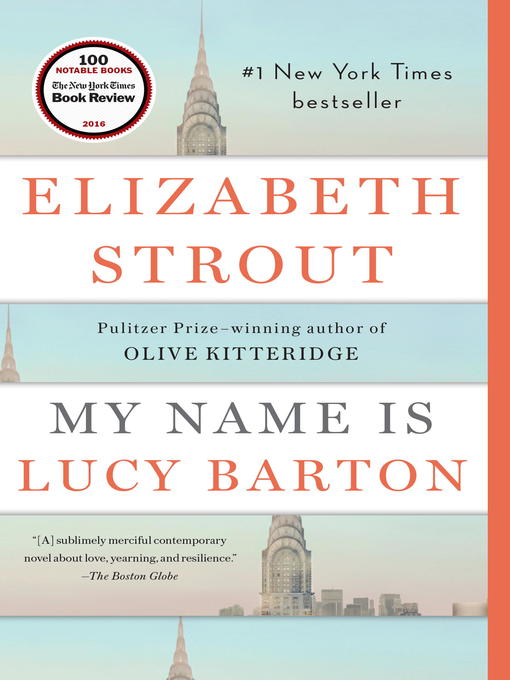
My Name Is Lucy Barton
A Novel
کتاب های مرتبط
- اطلاعات
- نقد و بررسی
- دیدگاه کاربران
نقد و بررسی

October 19, 2015
Despite its slim length, Strout’s (The Burgess Boys) tender and moving novel should be read slowly, to savor the depths beneath what at first seems a simple story of a mother-daughter reconciliation. Lucy Barton is shocked when her mother, from whom she’s been estranged for years, flies from tiny Amgash, Ill., to be at Lucy’s hospital bedside in New York. Convalescing from a postsurgery infection, Lucy is tentative about making conversation, gently inquiring about people back home while avoiding the real reason why there’s been no contact with her parents. Strout develops the story in short chapters in which the reader intuits the emotional complexity of Lucy’s life as she reveals long-buried memories of an isolated, profoundly impoverished childhood and the sexual secrets, “the knowledge of darkness,” that shrouded her life. Though her mother calls her Wizzle, an endearing childhood name that implies warmth and closeness, she is unable to tell Lucy that she loves her. Running counter to the memories of her harsh, stoic upbringing
is Lucy’s anguish at missing her own
two daughters, waiting for her at home. Lucy also reflects on other cruelties of
life in New York City, specifically the scourge of AIDS (the setting is the 1980s) and the underlying troubles of her marriage. Her narrative voice is restrained yet expressive. This masterly novel’s message, made clear in the moving denouement, is that sometimes in order to express love, one has to forgive. Agent: Molly Friedrich, Friedrich Literary Agency.

Starred review from October 15, 2015
From Pulitzer Prize-winning Strout (The Burgess Boys, 2013, etc.), a short, stark novel about the ways we break and maintain the bonds of family. The eponymous narrator looks back to the mid-1980s, when she goes into the hospital for an appendix removal and succumbs to a mysterious fever that keeps her there for nine weeks. The possible threat to her life brings Lucy's mother, from whom she has been estranged for years, to her bedside--but not the father whose World War II-related trauma is largely responsible for clever Lucy's fleeing her impoverished family for college and life as a writer. She marries a man from a comfortable background who can't ever quite quiet her demons; his efforts to bridge the gap created by their wildly different upbringings occupy some of the novel's saddest pages. As in Olive Kittredge (2008), Strout peels back layers of denial and self-protective brusqueness to reveal the love that Lucy's mother feels but cannot express. In fewer than 200 intense, dense pages, she considers class prejudice, the shame that poverty brings, the AIDS epidemic, and the healing powers--and the limits--of art. Most of all, this is a story of mothers and daughters: Lucy's ambivalent feelings for the mother who failed to protect her are matched by her own guilt for leaving the father of her two girls, who have never entirely forgiven her. Later sections, in which Lucy's dying mother tells her "I need you to leave" and the father who brutalized her says, "What a good girl you've always been," are almost unbearably moving, with their pained recognition that the mistakes we make are both irreparable and subject to repentance. The book does feel a bit abbreviated, but that's only because the characters and ideas are so compelling we want to hear more from the author who has limned them so sensitively. Fiction with the condensed power of poetry: Strout deepens her mastery with each new work, and her psychological acuity has never required improvement.
COPYRIGHT(2015) Kirkus Reviews, ALL RIGHTS RESERVED.

Starred review from November 15, 2015
Lucy Barton recalls her months-long stay in the hospital after suffering complications during a routine appendectomy. Her husband, overwhelmed with job and child-care responsibilities, summons Lucy's mother to stay with her, though they have long been estranged. Within the confines of her hospital room, Lucy and her mother seek to find common ground, gossiping about the neighbors in the small, rural town of Amgash, Illinois, where Lucy was raised. In this way, they avoid talking about the central event of Lucy's life, her impoverished childhood. Obliquely, the harsh details are revealed: Lucy was frequently hungry, dirty, and terrorized by her abusive father. She felt isolated, ashamed, and fearful, feelings that still surface in adulthood. It seems a small miracle that she escaped to college, got married, had children, and became a writer while her siblings remained mired in dysfunction. She never confronts her mother about the fact that she failed to protect Lucy; indeed, though they seem incapable of expressing it, their love for each other is palpable. In a compact novel brimming with insight and emotion, Strout relays with great tenderness and sadness the way family relationships can both make and break us.HIGH-DEMAND BACKSTORY: Anticipation will be high for a new novel by the Pulitzer Prizewinning author of Olive Kitteridge.(Reprinted with permission of Booklist, copyright 2015, American Library Association.)

























دیدگاه کاربران